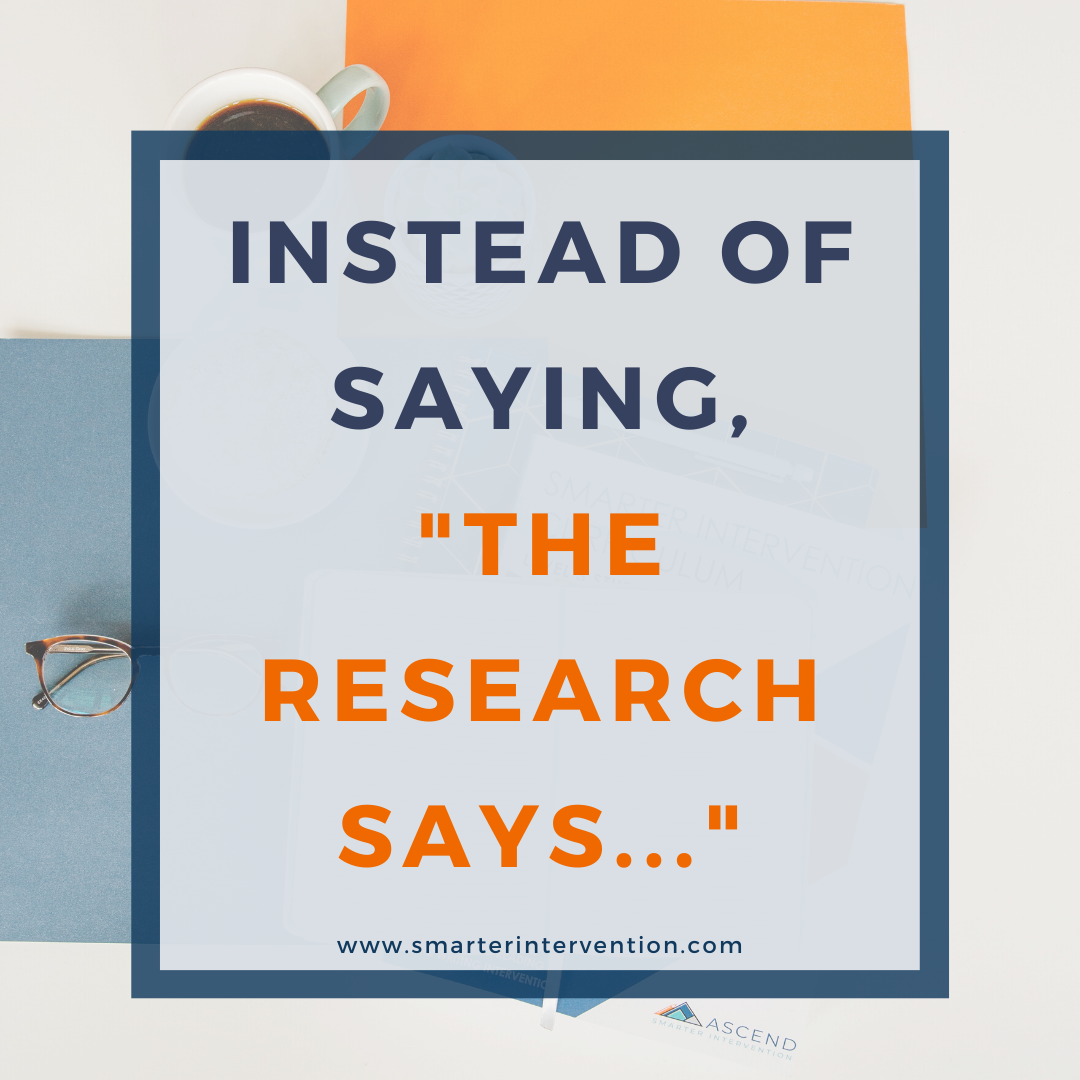Instead of saying, "The research says..."
How many times have you heard someone (or yourself) say, "But the research says [insert an excerpt from an article here]" to validate an approach or strategy?
We get this, it's entirely well-intentioned and honestly good in many ways BUT there's a better way to validate our approach and strategy in our literacy instruction.
Instead of using "The research says…"
…we should be using our own experiences, our own students, and our data to be driving us.
Listen - we are the first to say that we love research. Our team is made up of self-proclaimed research & data nerds. Members of our team come from research backgrounds (working with universities and research labs doing studies contributing to the Science of Reading) and we totally understand the importance of it.
But we have to stop saying, "The research says" to back up every claim we make in our instruction.
Let's not misunderstand - we ABSOLUTELY use the research and the science to guide our instruction and to think about WHY we are doing what we're doing but there are a few problems with ONLY using the research and not using our own experiences as educators working with a group of students right here in front of us.
When we think about research, we need to consider….
1. Research studies are designed to be controlled.
Research studies are designed to have as few variables as possible so that they can test their intended variable without other factors influencing the results. This is great for a research setting. However, it is not great in practice. Our classrooms? They are not controlled environments. We are going to see students with a wide variety of backgrounds, abilities, diagnoses, and behaviors, otherwise known as - variables.
2. Research is slow.
- like, pouring molasses straight out of the fridge slow. Research, because it is such a lengthy process, takes years to publish. Studies being done right now aren't going to be published and publicly available for another few years! By then, the students we are currently working with are already going to have moved on.
3. Research studies contradict each other.
In the literacy space, people tend to pick "sides" and claim that the research supports their instructional method. They're correct - they probably do have an article that can be cited in support of their instructional method.
However, for every article they're citing, one probably exists to support the opposite method. If you haven't read our blog examining the "reading wars," you can find it >>here.<<
We have to remember that research studies are designed to look at different things and studies can be found that contradict each other. We need to be careful that when examining the research, we keep an open mind and look at how the study was performed, how closely the parameters and participants resemble our setting and the kids we work with, and so on. Specifically finding an article in defense of what we are doing or just to contradict another approach isn't helping.
4. Sometimes research doesn't exist!
In contrast to our last point - sometimes research just doesn't exist yet! Being that it is such a slow process, sometimes we cannot find research studies that relate to the topics we are looking for.
5. Research has bias.
We have to consider factors like who is doing the research, where the funding for the research came from, and what the research is informing.
While research should be free of bias, it often isn't. Now, we aren't just talking about deliberate corruption. More often, it's implicit biases that sway the results. Research isn't a perfect science. It's not a strict formulaic algorithm.
While we should absolutely be using research-based practices to guide our instruction, we need to remember that the students we actually see each day may not fit the criteria used in the research studies we cling to so tightly. We need to remember that waiting for new research or throwing out entire approaches for the newest "trend" keeps us stuck in a "chicken or the egg" style loop. We need to remember that research isn't a perfect science and biases will exist.
So then - what DO we do?
First, let's stop saying "But the research says __________!" in support of or against every detail of our (or others') instruction.
Instead, let's build out a lesson framework rooted in research (you can read our blog about that >>here<<) and look at what has been going well with the approach we are already using.
Where can science help us improve what hasn't been working? Instead of relying on outside facts and information, let's do the best we can with what we have and make small adjustments as we go to best serve the kids in front of us.
So, to reiterate - use the research to build a foundation in your instruction but don't let that be the ONLY thing you use. Use your experiences with YOUR students. Analyze what's working well and what's not based on the data you have available to you. Use your data to determine what is working and what isn't in your instruction with your specific kids.
For a more in-depth look at how you can use YOUR data to drive your instruction - basically, how you can be your own research scientist, check out our training How to Create SOR Aligned Goals & Track Data in your 1:1 or Small Group Settings >>here.<< That way, instead of saying "but the research says…." you can say "based on what my data is showing …"



